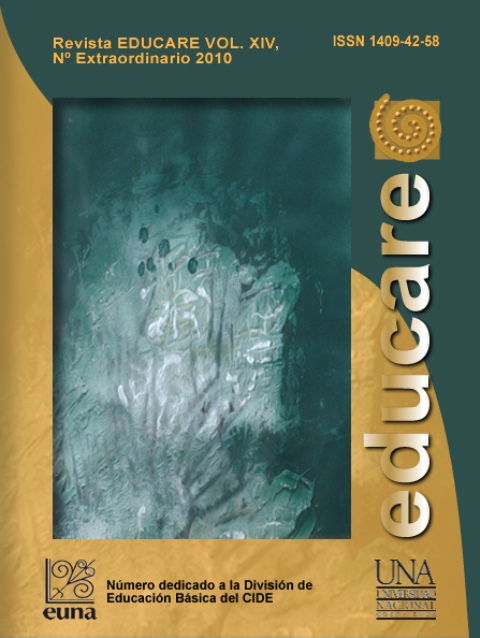The Pros and Cons of a Field Project: The case of the Laboratory School in Heredia
DOI:
https://doi.org/10.15359/ree.14-Ext.12Keywords:
pedagogical model, school identity, school project, school-based managementAbstract
This article reviews some of the most important characteristics of the Laboratory School in Heredia, Costa Rica, for recognizing the success aspects and setbacks that an innovative experience of an educational project has within the national education system. It is a description of the pedagogical model of the school and includes the vision that different participants have in this educational project, around which it is showed the different positions of the actors who live and reflect daily in the school.
References
Centro de Investigación y Docencia en Educación [CIDE]. (2010). Archivo administrativo Registro
de seguimiento a convenio con Escuela Laboratorio de Heredia. Documento sin publicar
Costa Rica. Ministerio de Planificación y Política Económica. (2005). Plan Nacional de Desarrollo
-2006: Informe final sobre el cumplimiento de las metas, los objetivos, las prioridades y
las acciones estratégicas 2004. San José: Ministerio de Planificación y Política Económica.
Costa Rica. Poder Ejecutivo. (1977). Decreto de Escuelas y Liceos Laboratorio. D. E. # 7125. San
José, Costa Rica: Autor.
Departamento de Estadísticas del MEP. (2008). Base de datos: Estadísticas de matrícula de I y II
ciclos de educación básica, para los años 2006-2008. Documento sin publicar: Ministerio
de Educación Pública
Espinoza, S., Fuentes, I., Hernández, M. y Jiménez, G. (2004). Modelo Pedagógico Institucional.
Documento no publicado.
Downloads
Published
How to Cite
Issue
Section
License
1. In case the submitted paper is accepted for publication, the author(s) FREELY, COSTLESS, EXCLUSIVELY AND FOR AN INDEFINITE TERM transfer copyrights and patrimonial rights to Universidad Nacional (UNA, Costa Rica). For more details check the Originality Statement and Copyright Transfer Agreement
2. REUTILIZATION RIGHTS: UNA authorizes authors to use, for any purpose (among them selfarchiving or autoarchiving) and to publish in the Internet in any electronic site, the paper´'s final version, both approved and published (post print), as long as it is done with a non commercial purpose, does not generate derivates without previous consentment and recognizes both publisher's name and authorship.
3. The submission and possible publication of the paper in the Educare Electronic Journal is ruled by the Journal’s editorial policies, the institutional rules of Universidad Nacional and the laws of the Republic of Costa Rica. Additionally, any possible difference of opinion or future dispute shall be settled in accordance with the mechanisms of Alternative Dispute Resolution and the Costa Rican Jurisdiction.
4. In all cases, it is understood that the opinions issued are those of the authors and do not necessarily reflect the position and opinion of Educare, CIDE or Universidad Nacional, Costa Rica. It is also understood that, in the exercise of academic freedom, the authors have carried out a rogorous scientific-academic process of research, reflection and argumentation thar lays within the thematic scope of interest of the Journal.
5. The papers published by Educare Electronic Journal use a Creative Commons License:















 The articles published by Educare Electronic Journal can be shared with a Creative Commons License:
The articles published by Educare Electronic Journal can be shared with a Creative Commons License: 



